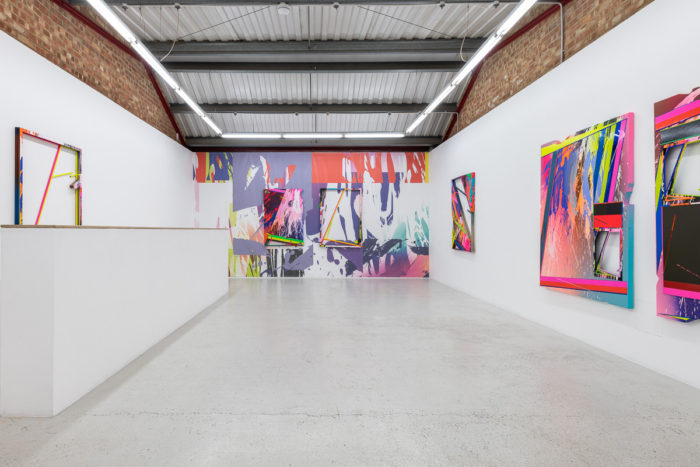
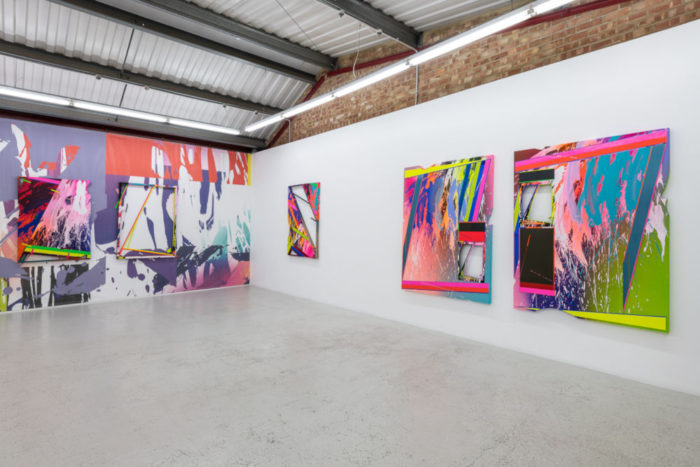
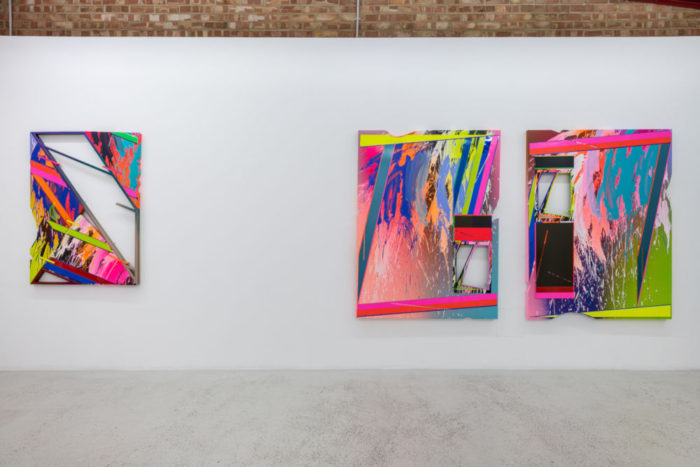
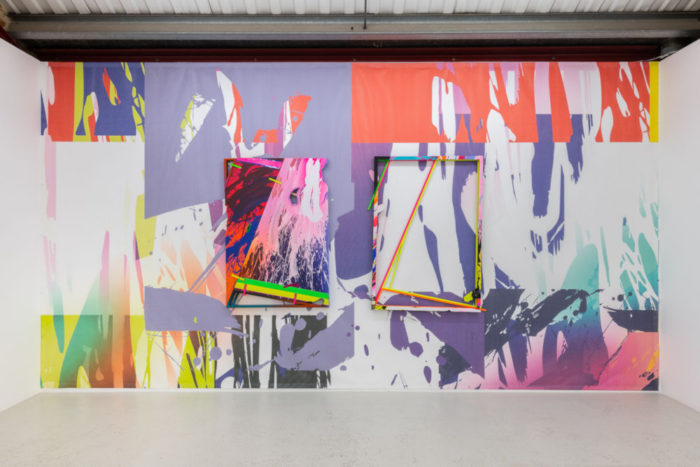
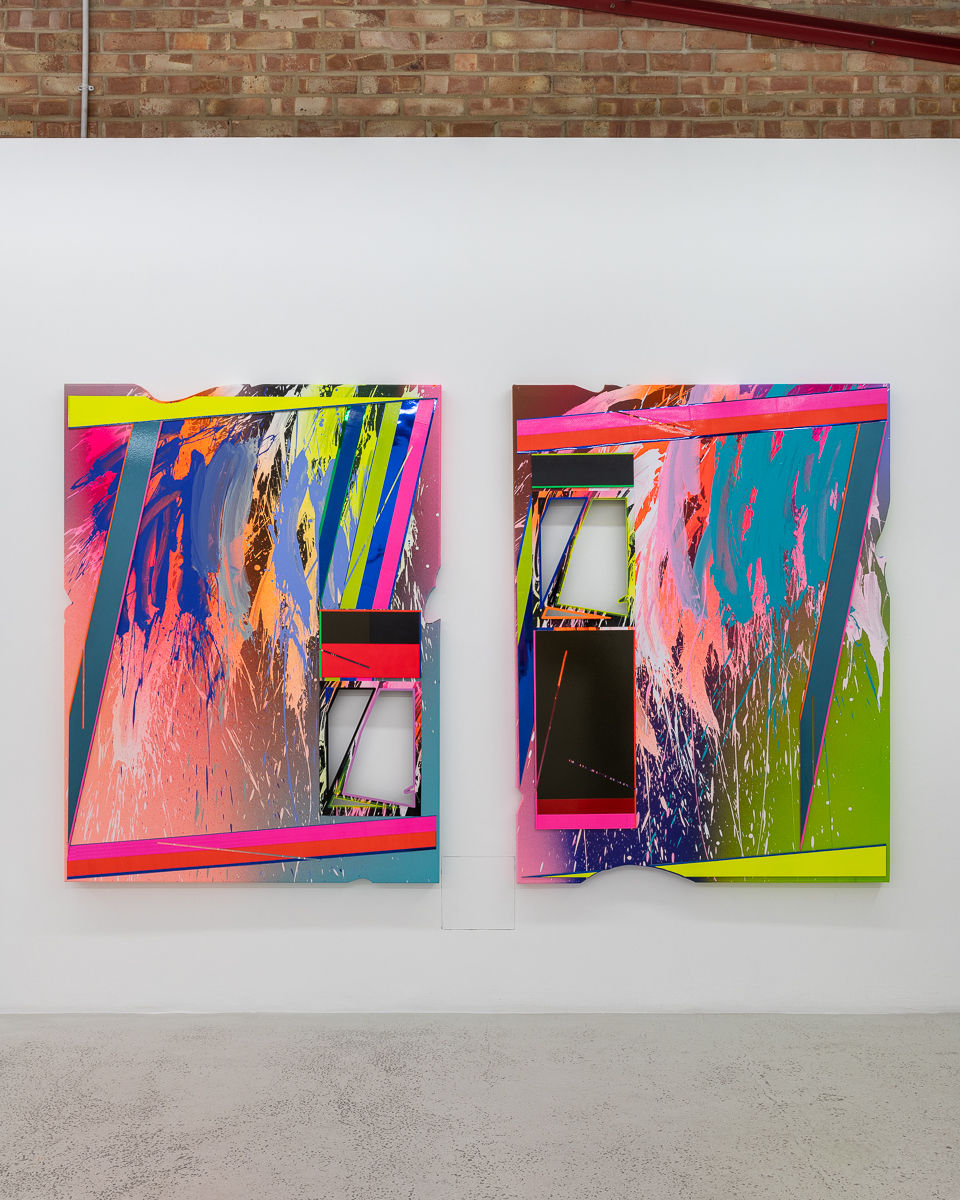
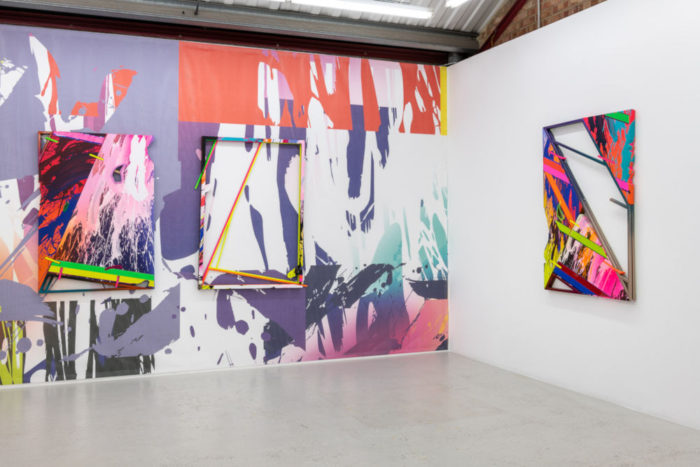
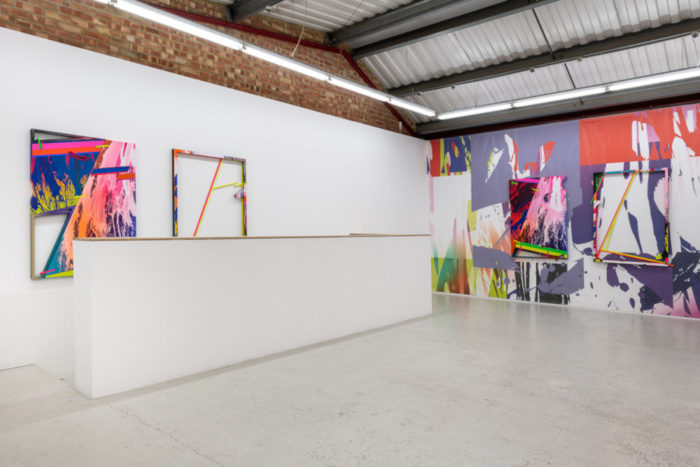
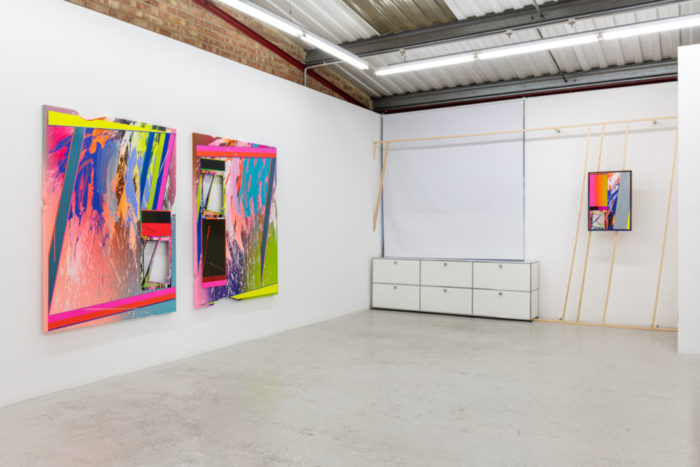
PR: Annka Kultys Gallery presents Márton Nemes: Ghosting Love, the gallery’s inaugural solo exhibition of the London-based Hungarian artist Márton Nemes’ new paintings.
Ghosting Love builds on Nemes’ successful participation in the gallery’s Cacotopia 03 group show of 2018-19 and sees the artist continuing to develop and explore themes related to the increasingly fragmented nature of modern life as lived in today’s urban metropolises.
The eight works on show in Ghosting Love are representative of three series within Nemes’ recent work, being respectively, the New Tomorrow series, the F.O.M.O. (Fear of Missing Out) series and finally the series from which the show takes its title, the Ghosting Love series. Yet while each series may be in itself distinct with its own themes and identifiably unique forms, all of the works in Ghosting Love exhibit Nemes’ vibrantly expressive aesthetic of saturated colorways, playful interventions with the pictorial structure and use of materials and architectural inspiration from the built environment.
The New Tomorrow series, represented by New Tomorrow 08 (2019), New Tomorrow 10 (2019) and New Tomorrow 33 (2019) in the exhibition, reaffirms the seminal aspects of the artist’s aesthetic. The structure of each painting, while appearing to begin with the traditional rectangular form, undergoes several significant interventions, from welded steel ‘mini-frames’ to create angular spaces within the surface of the work to use of panels of mirror board and laser cut plexiglass to bite-like disturbances in the frame itself, breaking its usual line and emphasizing the importance of the relationship of the structure to the work. Backgrounds are built up using layers of spray paint, echoing graffiti artists’ use of aerosols to create their art, and not unlike Jean-Michel Basquiat when he was one half of the Samo graffiti pair with his friend Al Diaz as they tagged the downtown Manhattan of the late 70s, Nemes played with graffiti in Budapest’s urban environment before arriving to study in the city of London. Layered over the spray paint are both explosions of bright and often fluorescent colour in boldly expressionistic gestures reminiscent of Jackson Pollock’s iconic abstract action paintings of the middle of the twentieth century and light-reflective vinyl again in bright saturated colours evocative of warehouse parties, rave culture and historic venues such as Manchester’s Hacienda night club.
The spaces Nemes creates within his works superficially invite comparison to the transcendentalism associated with earlier forms of abstraction (Mark Rothko being the most hyperbolic example of the spiritualist arguments oftentimes made for abstraction), although what they actually connote is something much more elusive. Are the windows on to the future and if so what sort of future? Expressions of loss or absence? References to the decaying or crumbling nature of dilapidated cityscapes? Or a tool to emphasize the work’s relationship with its surroundings?
Or are they references to sociological phenomena? In the F.O.M.O. (Fear of Missing Out) series, Nemes has taken his experiments with space even further by removing the canvas altogether, leaving only the frame itself and angular supporting structures within the plane where once the canvas would have been. Nemes’ motifs of saturated color remain on the frames and angular intra-plane structures but it is what is absent, the negative spaces within the works, that is the real subject matter of the series. The acronymic titles of the works refer to the social media phenomenon known as ‘fear of missing out’ or the anxiety related to exciting or interesting events happening elsewhere of which the individual is not participating, particularly experienced through posts on social media platforms. As a sociological phenomenon, FOMO can be viewed as a specific example of the more general malaise increasing urbanization has fostered on the denizens of large cities, as populations become more individualistic and socialize more via web-based apps, and in so doing, losing traditional forms of community and support, such as immediate and extended family.
Another social media phenomenon, that of ‘ghosting’ or the ending of a personal relationship by suddenly and without explanation withdrawing from all forms of communication, is explored in Nemes’ last series of works, Ghosting Love. Ghosting as a practice has emerged in parallel with the rise in popularity of using online dating apps, such as Tinder, as a means of meeting prospective romantic partners, and is thus a further example of how contemporary life moves individuals away from the real and into the virtual in the search for emotional fulfillment, yet nevertheless exposes those same individuals to the very real trauma of being ghosted as a result. The French novelist Michel Houellebecq presaged the underlying social isolation of modern society in his prize-winning 1998 novel Atomised, the story of two half-brothers and their loveless, loner existences in a future Paris. In the paired works Ghosting Love 05 (He) (2019) and Ghosting Love 05 (She) (2019), through various symmetries within the works, such as the positions of the structural spaces, the positions of the light reflective vinyl used and colour blocks in the composition, Nemes references the inter-relatedness of the two pieces while simultaneously emphasising their individuality and an arguably Houellebecqian separateness.
The final work in the series, Ghosting Love 06 (2019) is a relatively smaller work than its two companion series pieces, but has been installed by the artist against a timber super-structure covering the southern wall of the gallery, akin to the internal wood frames used to create walls and divide space in modern homes. Like Damian Hirst before him, Nemes has worked in the construction industry before changing his focus to producing art, which explains his skill in presenting contemporary building techniques. On the gallery’s north wall, Nemes has created a wall-sized mesh backdrop to the works exhibited there (New Tomorrow 08 and F.O.M.O. (Fear of Missing Out) 01 (2019)) as part of the show’s installation, a dramatic scaling of his aesthetic.
Márton Nemes was born in 1986 in Székesfehérvár, Hungary. He received an M.F.A. from Chelsea College of Arts, London in 2018 where he continues to live and work.
Writing via press release courtesy of the artist and Annka Kultys Gallery, London

Ironically, I became aware of Mr. Nemes work through Instagram and have never seen it in person. Perhaps sometime soon, love the work.